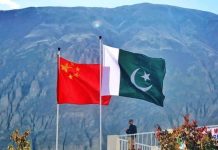BEIJING: In a world beset by the novel coronavirus disease (COVID-19), never has global cooperation been so urgent. The world needs cooperation not only to combat the virus through medical support and assistance, but also in terms of distributing vaccines.
China is placing itself in a pivotal position to assist countries in need, be it via financial assistance, donations or joint production and distribution. This virus is a global challenge, and it is fundamentally wrong for certain countries to position themselves first or see this pandemic through the medium of profit.
In dialogue and speeches from China’s leaders, we repeatedly hear the phrase “a community with a shared future for humanity.” What does that mean? And what is its significance?
The statement makes reference to the phenomenon of globalization and integration between countries, wherein owing to the impact of technology and telecommunications, the world is becoming an increasingly smaller, more connected and tightly knit place. Major events in countries, whether they are economic, political or natural, do not respect national borders and as a result increasingly have consequences for others too. Therefore, the statement implies that humanity, as one increasingly interdependent world, has to work together in order to solve the common problems and challenges they face, for the greater good.
A climate crisis in Australia, for example, is a climate crisis for the world. An economic crisis in America or China has repercussions for markets globally. Humanity no longer lives in isolated and discrete communities that do not depend on each other and do not contact each other. Everything in our world ultimately has global implications, from the goods we buy to the cultural products that we watch and absorb.
As a result, China’s leaders echo this statement in calling for a common diplomatic resolve to various global challenges, and warn against phenomena which disrupt it including protectionism, geopolitical divides and unilateralism. During this pandemic, upholding the concept is pivotal to the vaccine distribution and epidemic combat.
Although a number of vaccines have now been developed and are in early use, their distribution throughout the world has been fundamentally unequal. In a nutshell, wealthy countries have monopolized their usage and placed themselves at the front of the queue for receiving vaccines, neglecting nations that do not have the financial resources and scientific capabilities to help themselves. Traditionally, the West would support the non-West, assuming that they would never be in a position to have to fight a disease outbreak. However, because Western nations have been overrun by the virus, they are forced to put themselves first. For example, Canada is reported to have acquired 10 vaccines for every single person in the country, using firms such as Pfizer, while other countries such as the United States are taking a path of “vaccine nationalism” and refusing to cooperate with others. This reduces the options for poorer countries in acquiring vaccines, which are forced to wait until potentially 2022 or 2023.
– The Daily Mail-Beijing Review News exchange item






